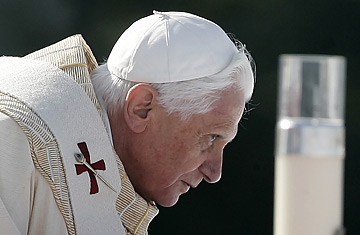
Pope Benedict XVI celebrates mass in the Campo de Marte military airport in Sao Paulo May 11, 2007.
His arrival in Sao Paulo is also a reminder of another of the German Cardinal's more notable crackdowns — his critique of "liberation theology," the Latin American movement that Ratzinger and John Paul II condemned in the 1980s for mixing Church teachings with Marxism. Speaking to reporters on his plane, Benedict reiterated his warning against "mistaken mixing of Church and politics, of faith and politics," insisting the Church's mission was the "education of personal and social virtues," not direct intervention in the political sphere. And while he spoke positively of the push for sainthood for progressive Salvadoran Archbishop Oscar Romero, who was killed in 1980 while celebrating Mass, Benedict complained that Romero's cause had been hijacked by supporters of liberation theology.
Of course, the battle lines in the region have changed considerably since John Paul wagged his finger at Nicaraguan priest and Sandinista government minister Ernesto Cardenal on a trip to Managua in 1983, warning him to "straighten out the situation in your church." Catholics in Latin America continue to fight for social justice, and disagreements persist about just how and if welfare policy and religious piety should cohabitate. But after the specter of Marxism faded and John Paul proved to be a great champion of the poor, new alliances have formed. Liberation theologians still say and write things that are at odds with the Vatican hierarchy, but liberation theology as such is no longer at the center of the debate, although the issues it raised remain so — today, the Church is conducting a more broadly defined debate about how to fight for social justice. For example, a group of progressive bishops last week sent a letter to the Brazilian National Bishops Conference urging a more enlightened stance on social issues.
In fact, with communism gone as an historical antagonist to the Church, there may be more room for social activists and the Roman hierarchy to seek solutions together. It seemed only natural this week for the Pope and Brazil's leftist president Luiz Inacio Lula da Silva, a longtime ally of the liberation theology movement, to agree on making a central priority of shrinking of the gap between rich and poor, and challenging the "mercantilization" of human beings in an age of globalization. Benedict, on Friday, led the canonization ceremony in Sao Paulo for the first-ever Brazilian-born saint, an 18th century Franciscan priest named Frei Antonio San'Anna Galvao, admired for his work with the disadvantaged. He praised Frei Galvao's "willingness to be of service to the people whenever he was asked... a bringer of peace to souls and families, and a dispenser of charity especially towards the poor and sick." Benedict is also set to visit a drug rehabilitation center on Saturday in the town of Aparecida.
Helping those in need is at the very heart of the Christian faith, and Benedict appears inclined to strongly reiterate that principle. In his 2005 encyclical, he wrote passionately about the need to faith and charity one and the same. "For the Church, charity is not a kind of welfare activity which could equally well be left to others, but is a part of her nature, an indispensable expression of her very being," he writes. "It is time to reaffirm the importance of prayer in the face of the activism and the growing secularism of many Christians engaged in charitable work."
Duncan MacLaren, the executive director of Caritas, the worldwide Catholic charity, says Benedict's message is a subtle departure from the Church's tradition of social teaching, which has been about changing unjust social structures. MacLaren told TIME: "The Pope is saying that there is something inside us, that there should be a Christian transformation within the process of people serving others." But it remains to be seen whether Benedict's emphasis on a personal spiritual response to poverty and inequality will satisfy those in his church who emphasize the fight for social justice outside of its walls.
—With reporting by Andrew Downie/Rio de Janeiro
